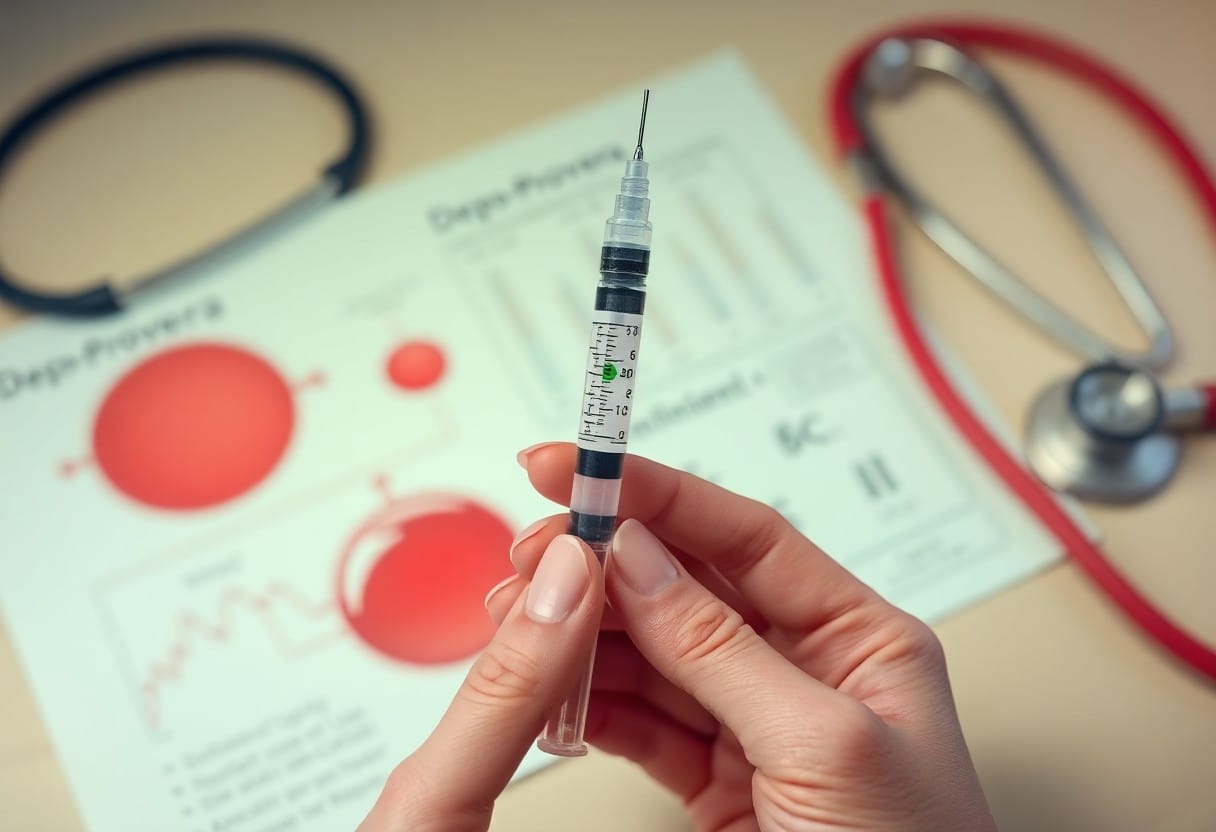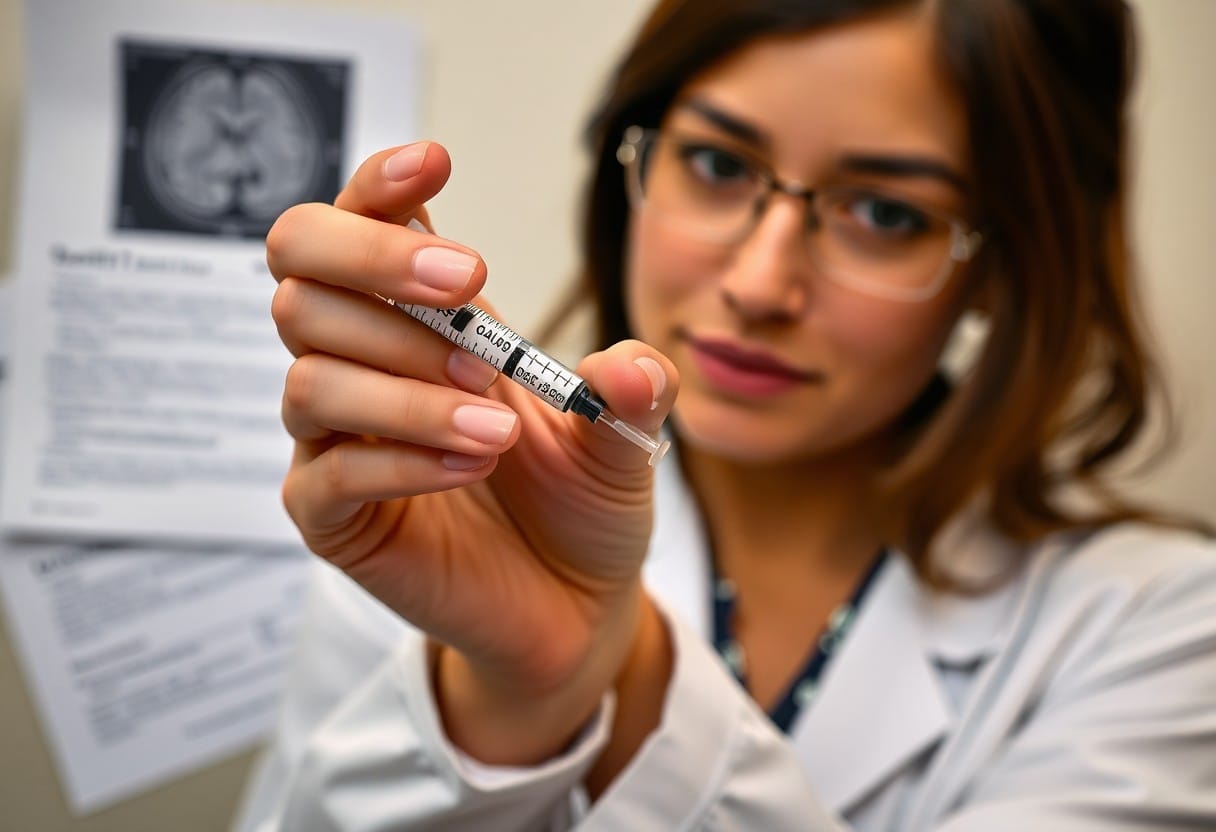Most women using Depo-Provera, a popular contraceptive injection, may not be aware of potential health risks associated with the medication. Recent studies have pointed to a possible link between Depo-Provera and an increased risk of meningioma, a type of brain tumor often considered benign. Understanding the connection is vital for making informed decisions about your reproductive health. In this article, you will learn about the implications of this association and what steps you can take to ensure your safety while using this form of contraception.
Understanding Depo-Provera
For many women seeking effective birth control, Depo-Provera provides an option that combines convenience with long-lasting effects. This hormonal contraceptive is administered via injection, offering a method of preventing pregnancy for up to three months. By understanding how it works and its implications, you can make informed decisions about your reproductive health.
What is Depo-Provera?
At its core, Depo-Provera is a contraceptive injection containing the hormone medroxyprogesterone acetate. This synthetic progestin works by inhibiting ovulation, thickening cervical mucus, and thinning the uterine lining, thus preventing pregnancy. Administered every 12 weeks, it becomes a preferred option for many due to its ease of use and reliability.
Uses of Depo-Provera
By predominantly serving as a birth control method, Depo-Provera is also utilized for treating various medical conditions, including endometriosis and menstrual-related issues. Its hormonal regulation can help alleviate severe menstrual cramps and heavy periods, providing both contraceptive and therapeutic benefits.
With its dual role in birth control and management of uterine conditions, Depo-Provera can significantly improve your quality of life. However, it’s necessary to be aware of potential side effects such as weight gain, mood changes, and potential impacts on bone density. Always consider discussing the advantages and risks with your healthcare provider to determine if this method aligns with your health goals.

Overview of Meningioma
Even though meningiomas are generally considered benign, they can lead to significant health challenges. These tumors arise from the protective membranes covering the brain and spinal cord, known as the meninges. Understanding meningiomas can provide you with insight into potential symptoms, treatment options, and associated complications, making it easier to navigate this condition and its implications.
Definition and Types
At their core, meningiomas are tumors that originate from the meninges, with varying degrees of aggressiveness. Different types include:
- Benign meningiomas
- Atypical meningiomas
- Anaplastic meningiomas
- Transitional meningiomas
- Papillary meningiomas
The type of meningioma can impact both the treatment plan and your prognosis.
Symptoms and Diagnosis
On the whole, symptoms of meningiomas can vary considerably based on the tumor’s size and location. You may experience headaches, vision problems, or neurological issues that warrant further investigation.
But early detection is necessary, as symptoms can worsen and lead to serious complications. Some symptoms may include seizures, hearing loss, or cognitive changes. Diagnosis typically involves imaging tests such as MRI or CT scans, allowing healthcare professionals to accurately determine the tumor’s exact location and size. Seeking a timely evaluation will facilitate appropriate management and improve your overall outcome.
The Possible Connection Between Depo-Provera and Meningioma
It is necessary to explore the potential link between Depo-Provera, a commonly used contraceptive, and meningioma, a type of brain tumor. Current discussions suggest that some users may have concerns regarding their long-term health risks, particularly related to hormone exposure. Understanding the relationship between these two can empower you to make informed decisions regarding your reproductive health and overall well-being.
Research Studies
An increasing number of studies have investigated the potential connection between hormonal contraceptives like Depo-Provera and the risk of developing meningiomas. Some findings indicate that prolonged use may influence the rate at which meningiomas develop, though the evidence remains mixed. These studies underscore the need for further research to gain a comprehensive understanding of the relationship.
Expert Opinions
To gain insight into the potential risks associated with Depo-Provera, many experts emphasize the importance of individual factors, such as family history and overall health. However, they remain cautious, advocating for more extensive studies while reassuring users that the vast majority will not experience adverse effects. Your personal risk factors are critical in assessing the benefits and drawbacks of using this contraceptive method.
Hence, experts agree that while there may be a potential link between Depo-Provera and the development of meningiomas, they suggest that you weigh the overall benefits of contraceptive use against the possible risks. Many health professionals strongly advocate for discussing your concerns and individualized care with your healthcare provider, as you deserve the most thorough understanding of your healthcare choices. Transparent communication can help ensure your reproductive health and risk management are prioritized effectively.
Risk Factors and Considerations
Your understanding of the risk factors linked to Depo-Provera and meningioma is crucial for informed decision-making about your health. Key considerations include:
- Your family history of brain tumors
- Prior personal history of neoplasms
- Long-term usage of hormonal contraceptives
This information can help you take proactive steps in monitoring your health.
Who is at Risk?
Factors influencing your risk of developing meningioma include genetic predispositions, previous medical conditions, and the duration of hormonal contraceptive use. Being aware of these can aid in evaluating your overall health.
Alternative Contraceptive Options
Considerations for contraceptive methods vary based on individual health profiles and preferences. You may explore alternatives to Depo-Provera, such as IUDs, implants, or non-hormonal methods, which might better suit your health needs.
In fact, exploring these options may be beneficial for your health. Methods like IUDs provide effective birth control without hormonal effects, while implants offer long-term protection with minimal side effects. Non-hormonal methods, such as condoms or natural family planning, allow you to avoid hormonal side effects altogether, giving you control and peace of mind regarding your reproductive health.
Monitoring and Management
Keep in mind that regular monitoring is vital for maintaining your health while using Depo-Provera. Engaging in ongoing communication with your healthcare provider about any changes in your symptoms, and participating in scheduled follow-up appointments can help manage any potential risks associated with the use of this contraceptive method.
Follow-Up Care for Users
Users of Depo-Provera should prioritize routine check-ups with their healthcare professionals to assess for any changes in health status, particularly as they relate to neurological symptoms. Keeping a detailed record of your health history and any side effects you experience can facilitate informed discussions during these appointments.
Signs to Watch For
For those using Depo-Provera, it is vital to be vigilant for any signs that may indicate changes in your health. Symptoms such as persistent headaches, vision changes, or new neurological issues should prompt immediate consultation with your healthcare provider.
Follow up with your healthcare provider if you notice persistent headaches, migraines, or vision changes. These could be related to underlying conditions like meningioma, which may require timely intervention. Pay attention to any neurological symptoms, such as numbness, weakness, or changes in coordination, as these may signify a need for further evaluation. Early detection and management can significantly affect your health outcomes, so staying alert to these signs is vital.
Implications for Patients and Healthcare Providers
Despite the potential risk associated with the use of Depo-Provera and its possible link to meningioma, it is vital for both patients and healthcare providers to engage in open discussions. You should weigh the benefits of using Depo-Provera against the potential health implications, taking individual medical history into account. Healthcare providers must stay informed about emerging research and offer personalized recommendations based on the latest evidence, ensuring that you are fully informed about your reproductive health options.
Educating Patients
On your journey towards informed health decisions, it’s vital for you to understand the risks and benefits of Depo-Provera. Education on the relationship between Depo-Provera and meningioma empowers you to make choices that align with your health values. Engaging in dialogues with your healthcare provider and asking questions can lead to better outcomes and a comprehensive understanding of your options.
Best Practices for Prescribing
Among the best practices for prescribing Depo-Provera is to conduct a thorough risk assessment tailored to your health profile. Healthcare providers should discuss the potential connection between Depo-Provera and meningioma directly with you, ensuring you grasp both risks and benefits. Awareness of your medical history, including any previous neurological issues, can further guide your treatment plan.
At this point, you should understand that shared decision-making is vital in the prescribing process. Healthcare providers need to evaluate each patient’s medical history and potential risk factors rigorously. Frequent follow-ups after initiating Depo-Provera may be beneficial for monitoring any side effects. Keeping abreast of new studies and guidelines can inform risk-benefit discussions with you. It’s vital that your healthcare provider creates a safe space for you to voice concerns and preferences regarding your treatment options.
Final Words
Presently, understanding the connection between Depo-Provera and meningioma is vital for making informed decisions about your health. Research continues to explore the potential risks associated with hormonal contraception and brain tumors, which can impact your choices around family planning and overall well-being. It is vital to consult with your healthcare provider to discuss your personal risk factors and any concerns you may have, ensuring that you receive tailored advice that aligns with your health history and lifestyle.



















